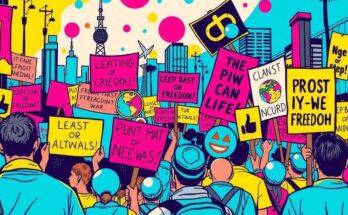Ecuador is preparing for a presidential election amid rising crime rates, with many victims poised to vote for change. Incumbent President Daniel Noboa, facing criticism and challengers like Luisa González, must convince voters that his approach to security is effective. As election day approaches, citizens express deep-seated concerns regarding personal safety and disillusionment with the political system.
On February 5, 2025, Ecuadorians prepared to cast their votes in a presidential election that carries significant weight, particularly given the rising crime rates in the country. Many citizens, including notable victims of crime, expressed their disillusionment with the current security situation, which has not improved since President Daniel Noboa assumed office. Incumbent Noboa faces competition from 15 other candidates, including former lawmaker Luisa González, as voters deliberate the future trajectory of Ecuador amid escalating violence tied to drug trafficking.
In Guayaquil, individuals readily recount their experiences with crime that pervade daily life, impacting their decisions at the polls. The rapidly worsening violence, linked primarily to drug cartels, has led many constituents to feel fearful and uncertain about their safety. Notably, the potential election outcome may hinge on whether voters feel confident in Noboa’s approach to combating crime or prefer an alternative route that emphasizes reform.
The election features a total of 16 candidates, with Noboa and González as the main contenders. Voters are assessing the candidates not only based on promises but also on the legacy of Rafael Correa and the concept of Correismo, which some fear could return. Therefore, many voters are caught in a dilemma between addressing immediate security concerns and weighing the political ideologies offered by each candidate.
While under Noboa’s presidency, the homicide rate has decreased, it remains significantly higher than previous years. Furthermore, kidnappings have continued to climb, reflecting a persistent threat to public safety. The president has taken assertive steps to combat rising crime, including invoking a state of emergency and mobilizing the military, but these measures have sparked debate regarding their effectiveness and legality.
Given the compulsory nature of voting in Ecuador, the turnout is expected to be substantial, including ballots cast by incarcerated individuals. Voter sentiment remains mixed, with a number of residents choosing to express dissatisfaction through blank votes, reflecting their lack of faith in the political system currently in place. This widespread discontent among voters highlights their desire for concrete solutions to the ongoing security crisis in Ecuador, where many residents believe drastic action is necessary to restore safety.
Ecuador is facing a severe increase in crime, particularly violent crime, which has escalated significantly over the past four years. The rise in violence has been linked to the activities of organized crime and drug trafficking emanating from neighboring Colombia and Peru, causing citizens to be deeply affected by personal experiences of theft and violence. Amid this backdrop, voters are tasked with selecting their president while weighing their discontent against the stability offered by incumbents.
In summary, the upcoming presidential election in Ecuador is heavily influenced by the pervasive crime affecting daily life. Many voters are grappling with their experiences of violence while considering whether to reaffirm President Noboa’s term or opt for an alternative. The election outcome could significantly impact the future of Ecuador—shaping its approach to crime and governance in an increasingly dangerous environment.
Original Source: apnews.com




